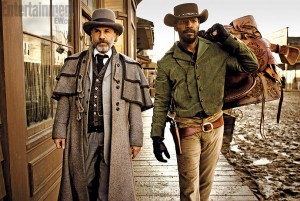Merry Christmas! “The Holly and the Ivy”
Posted on December 25, 2012 at 5:00 am
Posted on December 24, 2012 at 11:09 pm
Everyone who grew up in Chicago in the 50’s knows and loves this one:
Posted on December 24, 2012 at 9:55 pm
Posted on December 24, 2012 at 6:00 pm
 How do you solve a problem like Tarantino?
How do you solve a problem like Tarantino?
The prodigiously talented writer/director is a master of style, sensation, and a uniquely muscular kind of cinematic storytelling that builds on a stunning ability to mash up high and low art in a singular and wildly entertaining combination shot through with pure cinematic testosterone and filled with saucy variations on dozens of other films.
But then there is the content of the films, which it seems that Tarantino looks at as just another tool for jacking up a movie’s adrenalin. In “Pulp Fiction,” there was the shock of a literal shot of adrenalin to the heart of an overdosing character and the frisson of hired killers whose biggest concern about blowing someone’s head off is the challenge of getting the blood off the car upholstery. The purest expression of Tarantino’s art is in the “Kill Bill” movies, where he wastes no time on plot, just the minimum nod to the simplest and most relatable of motives — revenge.
In “Django Unchained,” as in his last film, Tarantino uses an actual historic atrocity almost as an afterthought or a placeholder. Like The Bride’s revenge motive, the Holocaust and slavery — and endless uses of the n-word by both black and white characters — are used to justify massive carnage, and, apparently, for no other reason. With “Kill Bill,” the less we knew about the specifics of the reason for the revenge, the better. With “Inglourious Basterds” and “Django Unchained,” we are already aware of the horrors that give the characters license to wreak destruction (artfully). But it is, ultimately, empty. Put another way: sound and fury, check. Signifying: nothing.
Foxx plays the title character. As the movie begins, slave dealers are marching a group of slaves in leg irons and with the scars of whip marks along their backs, through the wilderness. A cheerful man with an elegant, cultured manner pulls up in a cart with a big tooth mounted on a spring. He is passing as a dentist. He cordially offers to buy a slave but when the brutish, dull-witted men refuse, and the first massive slaughter of the story is underway, and all the other slaves set free. The man is Dr. King Schultz (Christoph Waltz, who won an Oscar as a Nazi for Tarantino’s “Inglourious Basterds”). He is a bounty hunter who hunts down “wanted dead or alive” men and kills them to collect the reward. In those pre-Google image search days, he needs Django to identify three brothers. The information on the wanted posters is not enough for a positive identification. He is opposed to slavery, so he makes a deal. He will keep Django a slave only long enough to complete the job.
Django proves so adept at the bounty hunter business that Schultz offers to bring him on as a partner. “Kill white people and get paid for it? What’s not to like?” Django replies. Django wants to rescue his wife, Broomhilda (Kerry Washington). When they tried to escape from their owner, they were separated and sold. Schultz says that Django will not be able to do it alone, and promises to help him get her back. Their travels take them through several different adventures and many nods and winks to other films (Franco Nero, the original Django, shows up in a brothel bar), including a completely hilarious scene with a bunch of proto-Klan types who can’t get the eyeholes right in their masks and some completely horrifying scenes with a slave torn apart by dogs and a seemingly endless “mandingo fight” to the death. Broomhilda is now owned by a man named Candy (his plantation is called Candyland). He is utterly corrupt and despicable, but even worse is his house slave (Samuel L. Jackson), because he betrays other slaves.
Tarantino gets top marks for style, as always. The violence and historical reversals are possibly intended to be empowering (oddly, Broomhilda is surprisingly less powerful than the usual Tarantino female characters). On the contrary, it is dispiritingly disrespectful to the people who suffered unspeakable atrocities. And Tarantino’s increasing distance between style and substance grows less palatable with each film.
Parents should know that this film includes extremely brutal, graphic, bloody, and disturbing violence with many characters injured and killed, an extended fight to the death, whipping and torture, prostitutes, slaves, some nudity, and constant very strong language including many uses of the n-word.
Family discussion: Why did Stephen tell Calvin his suspicions about Django? How does this movie show the influences of spaghetti westerns, American westerns, and “Blazing Saddles?” Any other inspirations?
If you like this, try: “Inglourious Basterds” and “Kill Bill”
Posted on December 24, 2012 at 6:00 pm
Fair warning: I seem to be impervious to the appeal of “Les Misérables.” I was not a fan of the stage show or the songs, but I understand that it is the most popular musical of all time, and I approached this movie version with an open mind. My take is that it will make the fans happy, but I am still unpersuaded.
The musical is based on Victor Hugo’s vast novel about Jean Valjean (a magnificent Hugh Jackman), who served 19 years in prison for stealing a loaf of bread to feed his family and spends the rest of his life trying to do good and to avoid the relentless pursuit of Police Inspector Javert (Russell Crowe), who is trying to put him back in prison for violating his parole.
When Valjean is first set free, he is bitter and angry. He repays the kindness of a priest who tries to help him by stealing valuable silver treasures from the church. Immediately captured, he is returned to the priest (played by Colm Wilkinson, the foremost Valjean in the stage version). But the priest insists that the items were gifts, and with the police watching, he encourages Valjean to take more. Valjean is transformed by this compassion and generosity, and he vows to be as good, loving, and devoted to helping others as the man who cared for him.
Years later, Valjean, under another name, is prosperous and public-spirited. He owns a factory and he is mayor of his town. Fantine (a heart-breaking Anne Hathaway) works in his factory to support a daughter she boards with an innkeeper and his wife. She loses her job because she refuses to sleep with a foreman and is forced into prostitution. Valjean is horrified and feels responsible. As she lies dying, he promises to care for her daughter, Cosette.
Valjean rescues Cosette from the corrupt innkeeper (Sasha Baron Cohen) and his wife (Helena Bonham-Carter). But he has attracted the attention of Javert, and so he and Cosette must hide. Ten years later, with Paris in the upheaval of a revolution, an idealistic young man named Marius (“My Week with Marilyn’s” Eddie Redmayne) sees Cosette (Amanda Seyfried) and instantly falls in love with her. In the midst of uprisings and violent reprisals, Valjean tries to keep his promise to Fantine and keep Cosette safe and happy.
 Production designer Eve Stewart has done a masterful job, making the setting as vibrant and as essential to the story-telling as any of the characters. Director Tom Hooper (“The King’s Speech”) made a critical contribution by having the actors sing their parts while they were filming, instead of pre-recording them to be played back when the movie was being shot. Since the movie is “sung-through” (all dialogue is sung rather than alternating speaking and singing), this gives the music a welcome organic quality and immediacy. Hathaway’s character is on screen for only a brief time, but her big number, the “I Dreamed a Dream” song memorably sung by Susan Boyle, is wrenching. Hooper keeps the camera on her beautiful face, like the “Nothing Compares 2 U” Sinead O’Connor video, the better to feel her anguish, and it is a stunning moment. Elsewhere, he over-does the artsy angles and sometimes assumes too much familiarity with the storyline. Crowe’s voice is not up to the task and Seyfried’s is stretched beyond its capacity. Newcomer to film Samantha Barks (from the London cast) as Eponine, the daughter of the innkeepers who also loves Marius, sings like an angel and lights up the screen.
Production designer Eve Stewart has done a masterful job, making the setting as vibrant and as essential to the story-telling as any of the characters. Director Tom Hooper (“The King’s Speech”) made a critical contribution by having the actors sing their parts while they were filming, instead of pre-recording them to be played back when the movie was being shot. Since the movie is “sung-through” (all dialogue is sung rather than alternating speaking and singing), this gives the music a welcome organic quality and immediacy. Hathaway’s character is on screen for only a brief time, but her big number, the “I Dreamed a Dream” song memorably sung by Susan Boyle, is wrenching. Hooper keeps the camera on her beautiful face, like the “Nothing Compares 2 U” Sinead O’Connor video, the better to feel her anguish, and it is a stunning moment. Elsewhere, he over-does the artsy angles and sometimes assumes too much familiarity with the storyline. Crowe’s voice is not up to the task and Seyfried’s is stretched beyond its capacity. Newcomer to film Samantha Barks (from the London cast) as Eponine, the daughter of the innkeepers who also loves Marius, sings like an angel and lights up the screen.
It’s a long slog at nearly three hours, for a non-Miz-head. But I came away with more understanding of those who are.
Parents should know that this is an epic story of struggle against oppression with disturbing and graphic abuse of prisoners and others, many characters injured and killed, sad deaths (including death of a child), and a woman accused of sexual misconduct and forced into prostitution.
Family discussion: How does the priest change Jean Valjean’s notion of what he should do? Why was Javert so conflicted? Why were the rebels willing to risk their lives?
If you like this, try: the PBS concert specials saluting the 10th and 25th anniversaries of the musical and the non-musical film versions